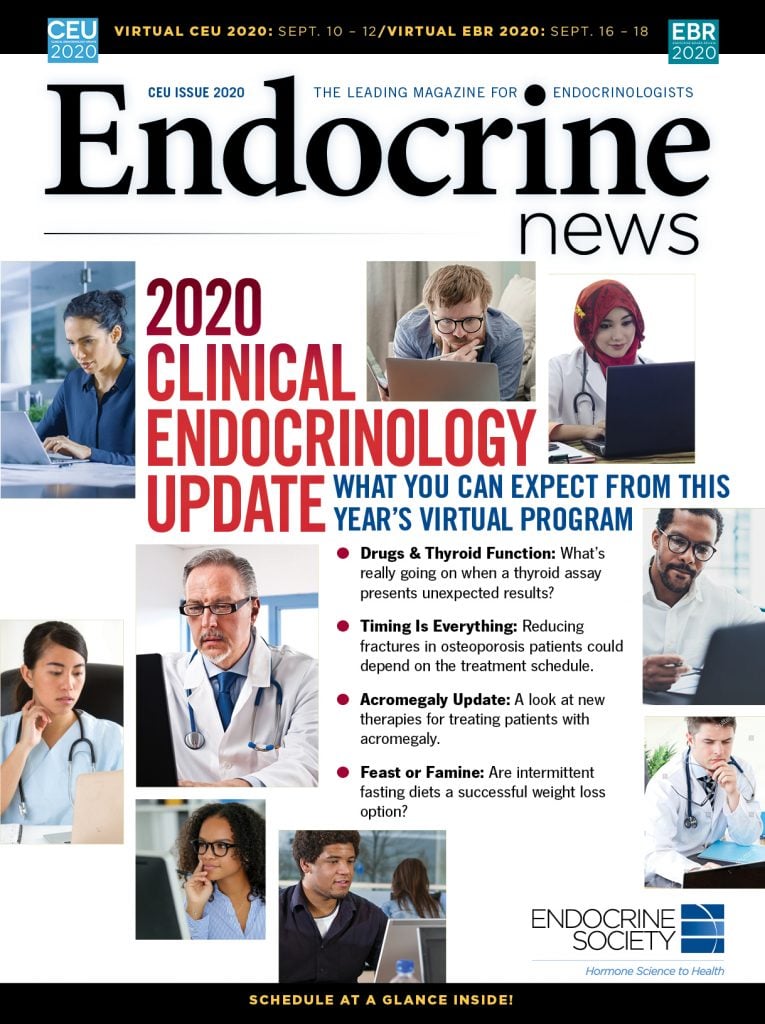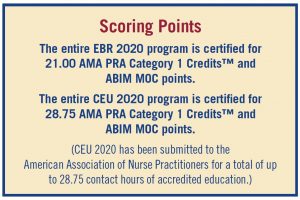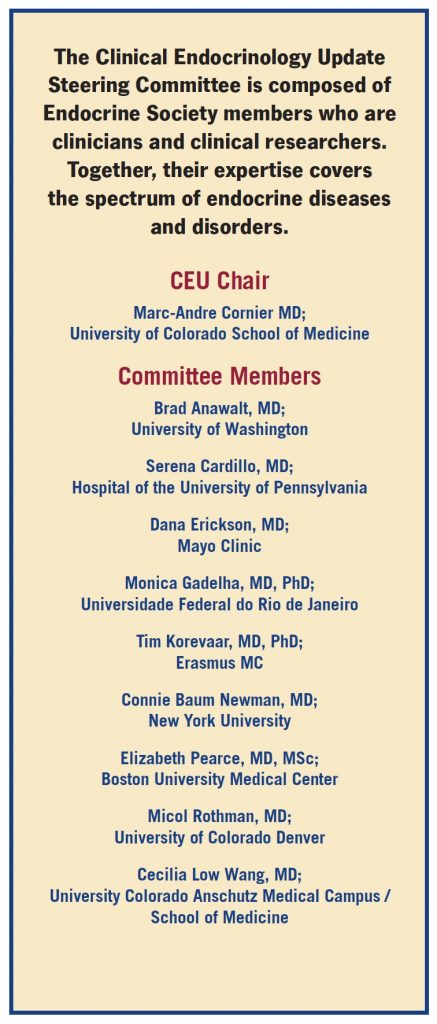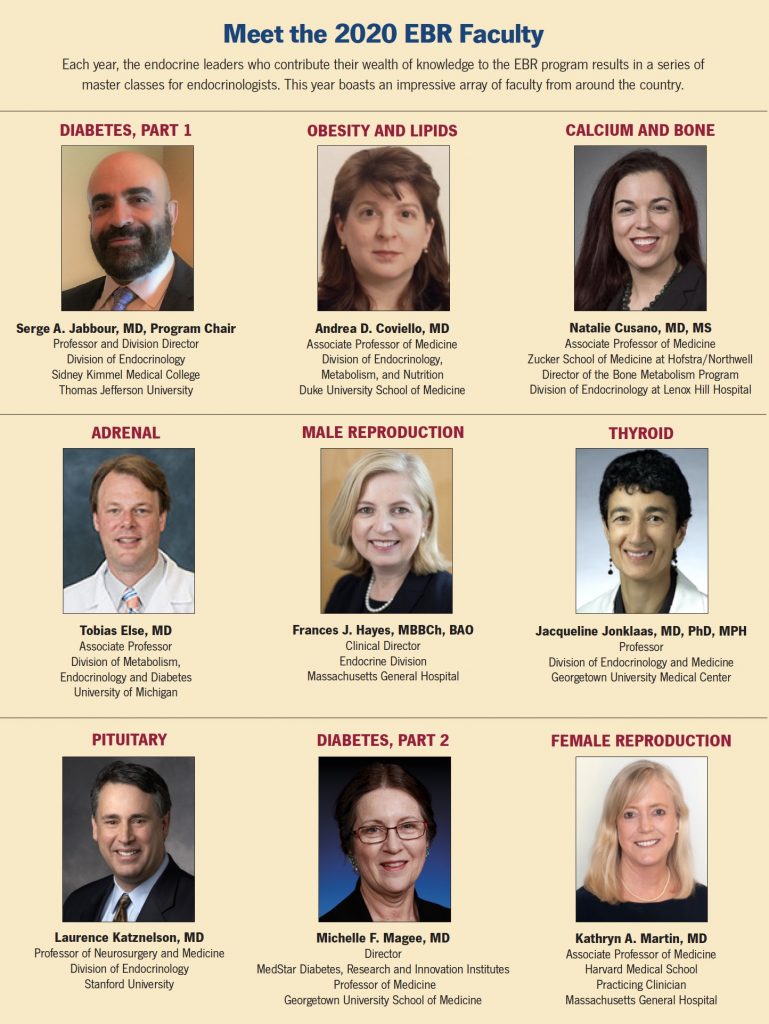
Endocrine News talks to Endocrine Board Review committee chair Serge Jabbour, MD, FACP, FACE, and Clinical Endocrinology Update committee chair Marc-Andre Cornier, MD, to find out what participants can expect from this year’s virtual offerings and why they are definitely the must-see events they’ve always been.
Every year, the Endocrine Society holds the Clinical Endocrinology Update (CEU) and Endocrine Board Review (EBR), bringing together hundreds of endocrine clinicians for a unique learning experience from revered leaders in the field of endocrinology from around the world.
This year, however, is going to be markedly different due to the omnipresent COVID-19 pandemic, which has made gathering in large groups next to impossible since social distancing is the order of the day, at least for the time being.
On the heels of the Endocrine Society’s successful, record-breaking ENDO Online 2020, both CEU and EBR will be held virtually in September. So instead of the hassles of booking a flight and packing suitcases, anyone interested in attending only needs to pop open their laptop from the comforts of their own home or office (after registering at www.endocrine.org/ceu2020/registration and/or www.endocrine.org/ebr2020/registration, that is).
For years, practicing endocrinologists have relied on CEU for their annual update on the latest diagnosis and treatment recommendations for a variety of endocrine conditions. Featuring an esteemed faculty from around the world who present a comprehensive, case-based program that will provide participants with knowledge participants can immediately apply in their own practices.
Taking place from September 10 to 12, CEU 2020’s diverse program will include both live and on-demand programming that will allow clinicians to stay up to date on the latest clinical advances without having to leave their homes or offices.
Every year, EBR has become an integral part of the preparation process for endocrinologists planning to take the endocrine board exam. This year’s virtual edition will occur September 16 – 18, and will benefit practicing endocrinologists through intensive practice for recertification or opportunities to earn requisite continuing medical education.

Endocrine News spoke with Jabbour and Cornier to learn more about CEU and EBR, their importance to all clinicians regardless of how many years they have been practicing, and why endocrinologists should make sure add them to their calendars.
Endocrine News: Since this year’s CEU and EBR meetings are going to be virtual for the first time, what can attendees expect from this new experience?
Marc-Andre Cornier, MD: CEU attendees can still expect a top-notch clinical update on endocrine practice. We will be offering both pre-recorded didactic presentations as well as live interactive case-based sessions such as Meet the Professors and Master Clinicians. The original full program that developed will be offered, just in a virtual format.
Serge Jabbour, MD, FACP, FACE: EBR this year is a virtual meeting with a combination of on-demand presentations released in late August, and live topical area Q&A taking place September 16–18, 2020.
“The CEU Planning Committee has put together another outstanding program this year, covering diverse clinical endocrine-relate topics presented by an expert faculty. There are so many presentations that I am excited about.” – Marc-Andre Cornier, MD, chair, Clinical Endocrinology Update Steering Committee
EN: Who should attend this year’s CEU and EBR meetings?
MAC: All practicing endocrinologists and other healthcare providers seeking an update in the latest clinical advances in endocrinology.
SJ: This unique course is perfect for any fellow or physician preparing for their endocrine board exam, or for those simply seeking a comprehensive and interactive knowledge assessment.

MAC: Registered attendees will have access to the pre-recorded sessions to view on their own time. They will then be able to login to the live sessions at the predetermined times on September 10, 11, and 12. These sessions will also be recorded for later viewing.
SJ: This course is based on the ABIM’s Endocrinology, Diabetes, and Metabolism certification examination, and includes on-demand access to comprehensive topical review sessions covering 220 case-based questions that span the spectrum of endocrinology. With each in-depth topical presentation, you can compare yourself against your peers, and receive a personalized score report to focus further studies.
In addition, over the course of the three days, there will be nine hours of live Q&A sessions during which you can ask our esteemed faculty your questions and receive personalized feedback and insights.
EN: As usual, CEU and EBR have outstanding 2020 programs with distinguished faculty. Are there any sessions you’re especially looking forward to?
MAC: Yes, the CEU Planning Committee has put together another outstanding program this year, covering diverse clinical endocrine-relate topics presented by an expert faculty. There are so many presentations that I am excited about. The Master Clinician sessions are always great interactive sessions, and I believe they will be just as impactful in this virtual format. I am also excited by our on-demand recorded sessions, such as the hot topic of “Does When You Eat Matter for Weight Management” and the “Update on Thyroid Surgery” presented by a leading thyroid surgeon, to name a few.
EN: For someone who is on the fence about participating because of a virtual format, what would you say to them to encourage their participation?
MAC: These are difficult times and changing the CEU meeting to a virtual format was no easy decision by the Endocrine Society and our committee. The program is identical to the program we had originally developed, so all the recent advances will be covered. There will also be ample opportunity to interact with the faculty during the live sessions. We are, therefore, very excited about the meeting in this new format. Also, the attendees can get all of this from the comfort of their own offices or homes!
SJ: It will be even a better experience because of the longer Q&A sessions with all experts, allowing you to interact with other attendees and ask the experts any questions on the topic of your choice.
EN: EBR is essentially a mock exam. How should attendees prepare?
SJ: There is no need to prepare in advance. EBR is meant to test your knowledge strengths and gaps so you know how to prepare best for the actual ABIM examination.
“This unique course is perfect for any fellow or physician preparing for their endocrine board exam, or for those simply seeking a comprehensive and interactive knowledge assessment.” – Serge Jabbour, MD, FACP, FACE, EBR, chair, Endocrine Board Review Steering Committee
EN: What can CEU participants expect from the virtual exhibit hall?
MAC: Participants will take part in product demonstrations and receive updates about the latest products and services that will help improve their practices in the CEU Virtual Exhibit Hall. These demonstrations and learning sessions are free to attend for anyone with an existing Endocrine Society account.




